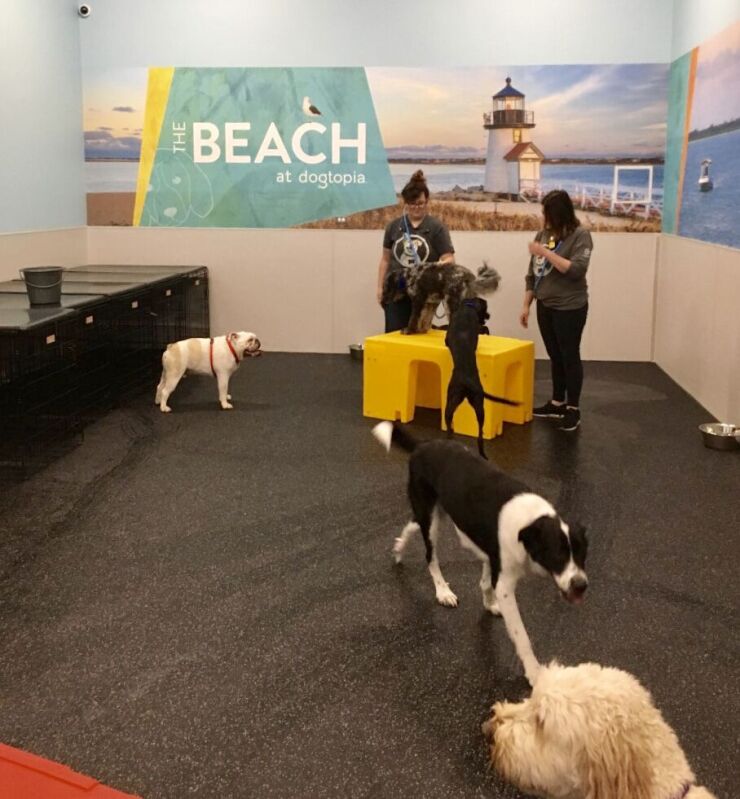Shoe manufacturer Wolverine Worldwide has teamed up with Dogtopia, a day care, boarding, and spa franchise for dogs, to offer an onsite doggie day care facility.
Wolverine Worldwide is the company behind popular footwear brands including Hush Puppies, Harley-Davidson Footwear, Chaco, Stride Rite and Keds. The employer’s Michigan-based corporate campus, which was already dog friendly, now provides employees with a centralized location where they can drop off their dog before work and visit during the day. The dogs are walked, fed, played with, groomed, and cared for in a variety of ways.
“There are so many competing demands on our employees, and they are only increasing,” says Jodie Kelley, vice president of global total rewards at Wolverine Worldwide. “It became a passion project for all of us to truly try to add benefits to our campus that were the most impactful.”
Pets at work have been the focus of trendy new benefits over the last few years. Indeed, 11% of employers offer employees a pet friendly workplace, according to the Society for Human Resource Management. Other pet-related benefits, like pet health insurance, are offered by 15% of organizations.
“We understand that employees’ lives are multifaceted, and there are those competing demands,” Kelley continues. “Our fur babies are just as impactful to us as our other family members.”
Dog friendly policies and benefits specific to pet ownership needs — like insurance and bereavement days — are a unique way for employers to attract and retain talent. A survey by Mars Petcare showed that 59% of respondents say they would choose to work for a dog-friendly employer over one that is not. Having pets at work can also boost productivity as it can foster better workplace communication and trust, according to research by the University of Southern California.
See Also:
While having a dog at the workplace does have positive health benefits, some employees may be too allergic or too afraid to have a dog right there under the desk. A day care facility allows employers to accommodate everyone in that situation, Kelley says.
For an employee’s dog to be enrolled in the onsite care, the animal must be up to date on vaccinations and show no signs of aggression toward people and other animals. Wolverine brand Chaco even made special collars for the dogs to wear once they clear any requirements. When other employees see the dogs wearing those collars they know the animal has met all the requirements to be welcome on campus.
“The synergies are so similar between children’s day care and dog day care,” says Kathy Halter, vice president of new center development for Dogtopia. “The relationship that pet parents have with their pup mirrors that.”
Dogtopia saw this as an opportunity for existing franchisees to expand their presence in the community and take their offerings to the next level. There is a Dogtopia franchise not far from Wolverine Worldwide’s headquarters, which is deliberate on the part of Dogtopia.
When working with employees the company wants employer clients to be in close proximity to their community locations, so employees can access the different offerings available there.
The benefit isn’t 100% employer paid however; there is a charge to the employee but it is subsidized by Wolverine by 25%, Kelley says.
The Dogtopia@Work service opened its first location on the Wolverine campus in September, with employees utilizing the facility on average about three and a half days a week. In January alone the facility had 193 uses from 53 different employees, Kelley says.
There are health benefits to having a pet including increased exercise, reduced stress, and reduced depression, according to the Animal Health Foundation. Having a pet can even lower a person’s risk of a stroke and heart attack.
“Being able to have that health benefit brought to [the workplace], there’s so much pride from the entire organization about what they’re able to provide for their employees,” Halter says.
There will be five additional Dogtopia@Work locations opening within the next year, and the company says about 10 to 20 the following year.






